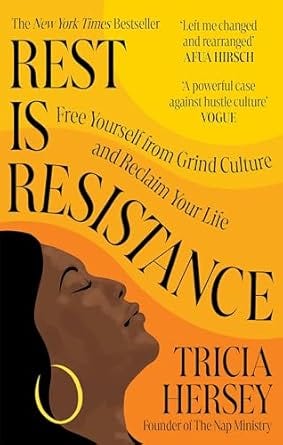Slow Reading Group: Rest is Resistance by Tricia Hersey - Part 1
Part 1: REST!
Hello, I’m Michelle from Opting Out, based in Brighton, UK. Subscribers can enjoy regular posts around slow living, rest, and opting out of burnout culture, plus my Weekend Mood Board of what’s currently inspiring me. Paid subscribers get access to ALL my work, including Slow Reading Group, live Co-Resting sessions, yoga nidra audios and pre-recorded full-length restorative yoga classes.
Its my dream to create a community of misfits, questioners and resters. Are you in? ✨
What happens when we claim rest not as a reward, but as a right? What shifts when we view rest not as individual self-care, but as collective liberation?
In Rest is Resistance, Tricia Hersey, founder of The Nap Ministry, offers a radical, embodied answer to these questions. Her work invites us to not only slow down, but to look deeper: at the systems that have told us rest is lazy, and at the ways those systems unequally extract from some bodies more than others. In this month’s Slow Reading Group, we explore Part 1 of the book: “Rest!”, looking through the lens of intersectionality, community, and personal reclamation.
ICYMI: Last month we discussed the Preface and Introduction.
What is Intersectional Rest?
The term intersectionality was coined in 1989 by legal scholar and civil rights activist Kimberlé Crenshaw to describe how overlapping identities, such as race, gender, class, and disability, compound systems of oppression. Hersey’s work builds on this foundation, pointing out how mainstream (often white, middle-class) feminism has failed to fully represent Black experiences.
Instead, she aligns with Alice Walker’s concept of womanism, which is grounded in race, class, gender, and community:
“Womanism holds space for race, class, and gender, and understands the family and community of a Black woman are collaborators in the struggle for liberation.”
In this light, rest isn’t a personal indulgence, it’s an act of resistance, deeply rooted in community care and collective survival.
Rest Is Not a Luxury
We live in a culture that demands we earn our rest: after work, after chores, after productivity. But Hersey flips this script - rest is not the reward, it’s the foundation.
Maslow’s hierarchy of needs places sleep in with other physiological needs such as food and air at the base of the pyramid — essential for survival. Yet rest is often treated as optional, even shameful. Hersey makes clear:
“The Rest is Resistance framework does not believe in the toxic idea that we are resting to recharge and rejuvenate so we can be prepared to give more output to capitalism.”
What if rest isn’t something we “do” to become more efficient, but a state of being that reconnects us with our inherent worth? What if we viewed it as being as necessary to our eudaimonia, our human flourishing?
Silence as Sanctuary
In a world of algorithmic noise, silence is a radical practice. Today, we receive more information every 48 hours than humanity generated in the first 5,000 years of civilization*. Hersey calls out the internet for what it is: a marketing tool designed to keep us consuming. Every scroll, every ping, every update erodes our stillness.
“Your mind needs space for silence. Space to process what it is feeling without the participation of others.”
Keep reading with a 7-day free trial
Subscribe to Opting Out to keep reading this post and get 7 days of free access to the full post archives.


